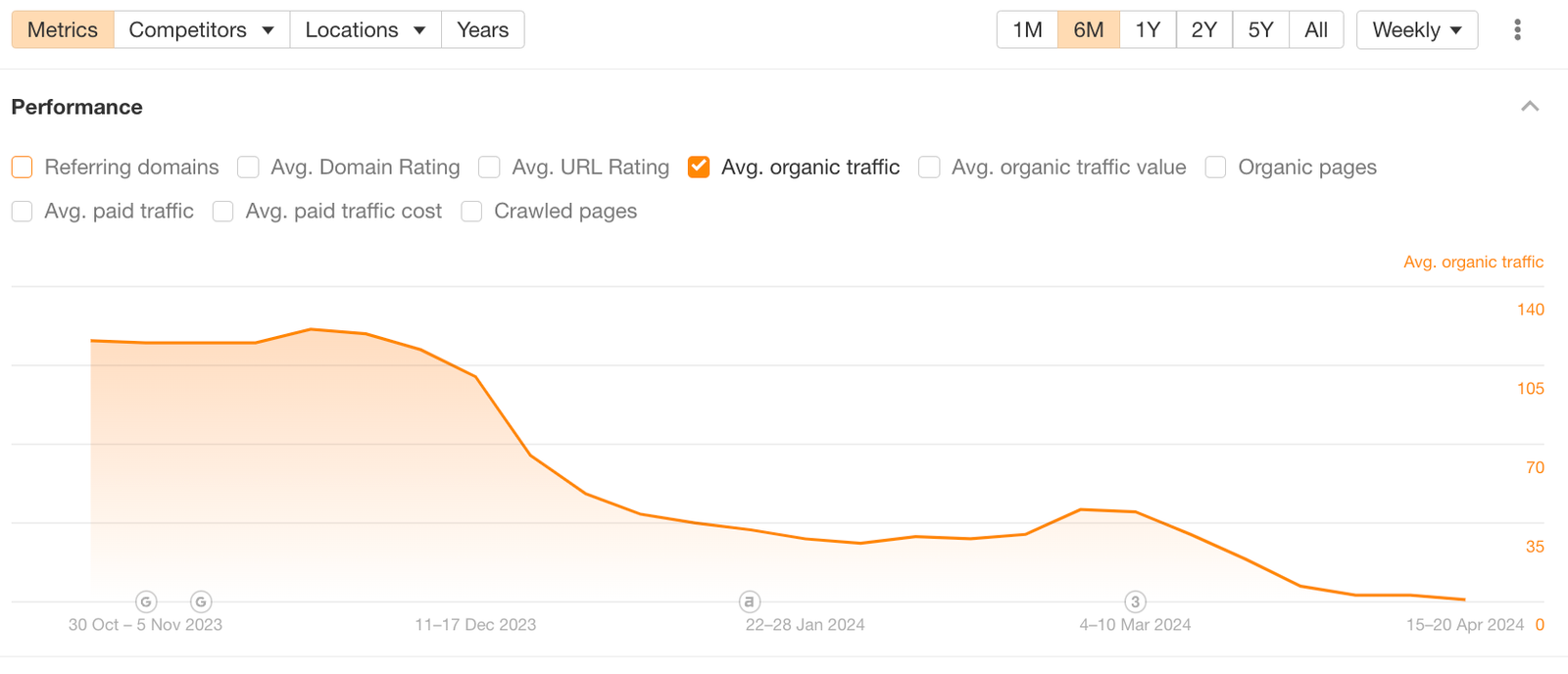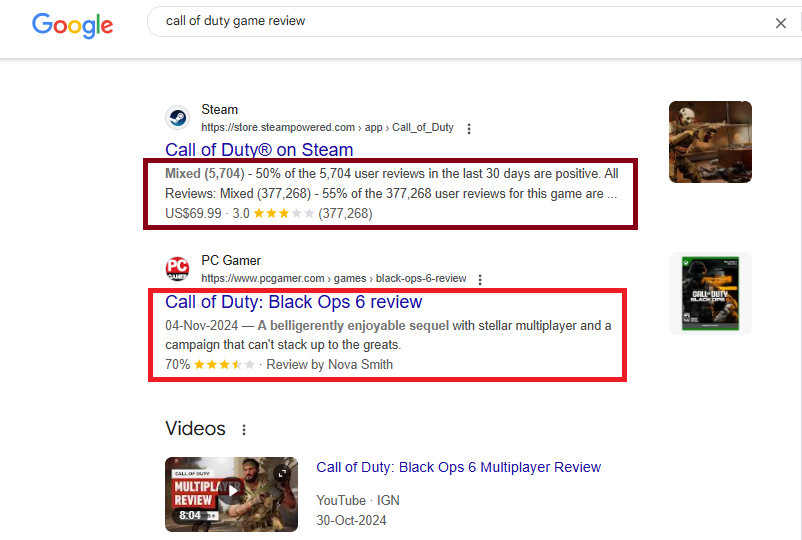Google has released another major search algorithm update that is causing a significant impact on how websites show up in search.
Their focus is to tackle spammy, low-quality content on search. With the recent flood of ChatGPT and AI-generated content onto the world wide web, I feel that this recent algorithm update is looking like a positive step in helping to clean up search results.
While the March 2024 Core Update has impacted the SEO world, it does prioritise helpful, original, and user-first content.
I’ll explain the key changes, how they affect your SEO strategy, and what to watch for so you can adapt.
Key insights from Google’s own words
Google is addressing two areas:
- Low quality and unoriginal results
- Spam results
Let’s dive into each.
Low quality content
Google states that their goal is to “reduce the amount of low-quality content on search” by 40-45%. The emphasis is on surfacing “helpful information on the web” while reducing unoriginal, low-value content.
Google has added the following spam rules to their algorithm as part of the 2024 Helpful Content Update:
- Scaled content abuse. If large-scale content generation, whether AI-driven or human-driven, offers no real value, it should be penalised.
- Site reputation abuse. This refers to the practice of targeting low-quality third-party content that exploits the reputation of larger, trusted sites in order to rank well.
- Expired domain abuse. Cracking down on the reuse of expired domains to manipulate search rankings.
Google’s aim here is to improve search quality and get rid of spam tactics and loopholes that undermine the algorithm.
Has the update affected your website’s SEO?
If you’ve noticed a sudden drop in rankings or traffic, your site might have been affected.
Here’s how to check and what to look for.
Use Google Search Console
- Look for drops in impressions, clicks, and average positions on key pages.
- Check for “Page Experience” warnings or manual actions under “Security & Manual Actions.”
Use SEO tools
- Tools like SEMrush, Ahrefs, and MOZ can show if your site has lost visibility in the search results.
- Look for sudden dips in ranking positions or loss of high-traffic keywords.
Check website analytics
Use Google Analytics to spot drops in organic traffic. Specifically, look for declines starting around March 2024, as this is when the update was rolled out.
For example, several big guest posting and blogging sites have seen their organic traffic collapse, often to zero.
This screen shot shows the decline in organic traffic on a popular blogging site over the last 6 months, with the most recent decline occurring as part of the March 2024 update.

Yes, some websites have lost all their organic traffic. Why?
In many of these situations, the information published to the site in the first place was of low quality, often generated by AI, scraped from other websites, and made solely for the goal of manipulating search rankings.
And it’s these practices that search engines are now targeting.
Google stresses how important it is to adapt to these changes if you want to keep or improve your search results.
What to look out for
Here’s a few key red flags.
AI-generated content
We all saw this coming when ChatGPT swept the globe—Google now ta rgets “scaled content abuse,” which is basically AI-generated content published at scale with little human oversight. This has been rampant and has resulted in a glut of subpar content across the internet.
As such, if you rely on AI tools for content, you need to review, edit, and enrich each piece with your own insights to add authenticity and value.
Low-quality third-party content
If you allow guest posts or third-party content, ensure it aligns with your site’s purpose. Websites hosting “low-quality, third-party content” used to manipulate rankings are now in Google’s crosshairs.
It could be wise to audit third-party content on your site. Remove or improve posts that feel off-brand or irrelevant.
Misuse of expired domains
If you bought a domain with past search authority, ensure your content aligns with its historical use. Google now flags sites as spam if they change their purpose after purchasing a domain.
Poor user experience
Google’s updated signals now assess the overall user experience (UX) of a site, including ease of navigation, mobile friendliness, and content readability.
Tips:
- Run your site through Google’s PageSpeed Insights and Mobile-Friendly Test to ensure fast load times and smooth navigation.
- Consider investing in a UX designer to audit and suggest improvements to your website’s user experience.
Focus on Expertise, Authority and Trust
It’s best practice to publish content that showcases your experience and knowledge. The best way to do this is to optimise for E-A-T (Expertise, Authoritativeness, and Trustworthiness). This is essential for website owners aiming to improve their SEO performance.
E-A-T is a key factor in how search engines, like Google, evaluate the quality and credibility of a website, particularly for industries such as health, finance, and education.
To boost E-A-T, publish content under your name with your credentials to show expertise. Share unique insights, first-hand experiences, and factual, verifiable information. This demonstrates authority and builds trust, helping to position your website as an authority in your industry.
For example, take a look at the legal blog content published on Randle & Taylor Barrisiters and Solicitors website.
https://randletaylor.com.au/blog/writing-a-will/
These articles are published in the name of the principal lawyer “Nick McCabe” and feature his author box: Nick McCabe has over twenty years of legal experience after being admitted to practice in February 2000. He is an experienced advocate for his clients, regularly appearing in the Supreme Court, District Court, and Magistrates Court.
The content is detailed, factual, and well-written. It’s this type of content that search engines want to prioritise and rank for their users. Here are some of the well-optimised components of this content:
- Correct on-page optimisation
- Authored by the principal lawyer, helping with E-A-T
- Longer-form FAQs to cover the topic broadly.
Time to reassess your SEO strategy?
To wrap it up, the March 2024 Core Update is a clear signal from Google—it’s time to prioritise quality, originality, and user experience.
If your website has been heavily impacted by this latest update from Google and you’re feeling overwhelmed, reach out for advice on how to get your site climbing back up the search rankings.
Key takeaways
- Focus on helpful, user-first content
- Optimise AI-generated content with a human touch
- Avoid low-quality guest posts from third-party websites.
Marshall Thurlow is Director and Founder of Orion Marketing Pty Ltd. He is a digital marketer with expertise in SEO, website design, content marketing, and project management.








